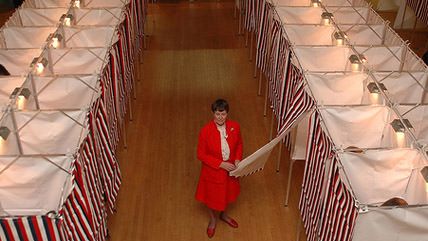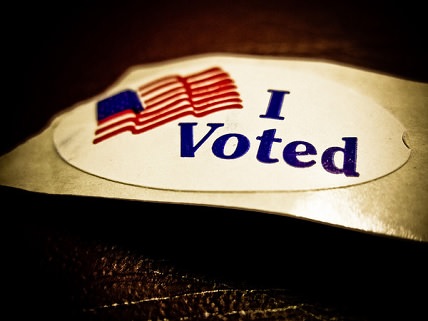Facebook and Google Are Changing Elections


Simple and personal are two things not often used to describe government. Internet giants like Facebook and Google want to change that for Election Day.
The Hill explains:
"While every election is important, the voting process can often feel complicated, with the information about how to head to the polls spread across multiple official sources," Google executive Anthea Watson Strong wrote in a recent blog post.
To simplify the process, Google is displaying state-specific details when people use search phrases such as "register to vote" or "how do I vote."
Searching on Google for "who is on my ballot" brings up a list of all the candidates running for the federal, statewide and local offices in any given area, while "where is my polling place" lists local polling places.
A Google page specifically set up for the elections — google.com/elections — lists the latest news and YouTube videos about the candidates as well as aggregated data about common political Google searches.
Facebook users may have noticed the "I'm Voting" button, known as the "voter megaphone," at the top of their newsfeed today. It's been rolled out slowly each election season since 2008, and it's now visible to anyone 18 or over.
"Our effort is neutral," a Facebook representative tells The Verge. "While we encourage any and all candidates, groups, and voters to use our platform to engage on the elections, we as a company have not used our products in a way that attempts to influence how people vote."
Still, people have been wary of the social media site's influence since it conducted an apolitical psychology experiment by tailoring what shows up on a user's newsfeed. And, the vote button did, according to a 2010 study, account for around 600,000 additional votes that year. "If you're told your friends have voted, you're 0.39 percent more likely to vote than someone who hasn't," The Atlantic explains.
In general, social media and technology are playing a larger role in the way people participate in our democratic republic. "Sixteen percent of registered voters said they follow politicians on social media, compared with the 6 percent who said they did so in 2010. The leap has been even bigger among middle-aged voters. Of registered voters from 30 to 49, 26 percent said they follow politicians online and 40 percent of whom said they've used their phones to help keep up with news about the elections," CNN reports based on Pew Poll data released yesterday.
Reason previously noted that another tech giant, Microsoft, has also put some skin in the game. They've predicting the outcome of the election. Guess who the big winners are.
Editor's Note: As of February 29, 2024, commenting privileges on reason.com posts are limited to Reason Plus subscribers. Past commenters are grandfathered in for a temporary period. Subscribe here to preserve your ability to comment. Your Reason Plus subscription also gives you an ad-free version of reason.com, along with full access to the digital edition and archives of Reason magazine. We request that comments be civil and on-topic. We do not moderate or assume any responsibility for comments, which are owned by the readers who post them. Comments do not represent the views of reason.com or Reason Foundation. We reserve the right to delete any comment and ban commenters for any reason at any time. Comments may only be edited within 5 minutes of posting. Report abuses.
Please to post comments


This is also why the government is trying to destroy the internet. They've spent years rigging the current system, they don't want to have to rig a different one.
And Google and Facebook are telling me who to vote for.
It's a trap!
"Candy Crush" is not a real candidate! Even if it would be a cool name for a Congresswoman!
I might pull the lever for her, IYKWIMAITYD.
FOE who should I vote for?
His mom.
I thought he had two dads?
I am a time traveler from the past.
Rule 34.
From the past, dummy. That means my parents are long dead.
Geez, in my day people weren't so dense once they survived childhood.
Whatever. I don't know where all the Time Corps took you on your joyride. As far as I'm concerned, you time travelers are all perverts.
Which past? and prove it by telling me what Hitler's favorite colour was?
White.
Damn you Fist!!!! Are you typing these responses via Arpanet? that would explain your timeliness in the links somehow.
There, I gave someone 20 minutes to post something.
I'm not "middle-aged"!!
Am I? How could this happen?
brb screaming until I pass out
Fuck. I'm too old to be middle-aged now. When did that happen?
Wait, what? What happened to 40? Since when was 37 ever middle-aged?
Jesus! Aaahhh!
I'm not middle aged. I plan on living to 117. It's that simple. I learned how to move metric goalposts from the government.
I've been resigned to middle age for a while now...beats the next stop "elderly" or "senior citizen".
I'm too cute to be middle aged!
It's hard to imagine the sort of apathetic retards who live on Facebook actually going out and voting, for which we may offer thanks to the deity of our choosing.
...for which we may offer thanks to the deity of our choosing.
....
Obviously not a Calvinist.
"For which we thank God, who has already damned the wicked inhabitants of that modern day Sodom, Amsterdam."
/My Dutch relatives.
"If you're told your friends have voted, you're 0.39 percent more likely to vote than someone who hasn't," The Atlantic explains.
Zero point three nine percent.
Hardly seems worth it.
"... the voting process can often feel complicated, with the information about how to head to the polls spread across multiple official sources," Google executive Anthea Watson Strong wrote in a recent blog post.
To simplify the process, Google is displaying state-specific details when people use search phrases such as "register to vote" or "how do I vote."
Searching on Google for "who is on my ballot" brings up a list of all the candidates running for the federal, statewide and local offices in any given area, while "where is my polling place" lists local polling places.
Thank you, Google, for making it easier for idiots to vote.
I somehow managed to talk a die-hard democrat out of voting today. He was bullying a friend into voting and said 'you can't bitch and moan and then not do something and vote.'
I defended him by saying the point that has been made here numerous times, "it's statistically pointless to vote, and a no vote is perfectly valid. It means you don't support either candidate."
He posted a picture of McConnell and said "not voting = voting in a republican senate."
My response: "... and you proved my point. They can always expect your vote. They can now arm more local law enforcement agencies to suppress minorities, bomb countries we aren't at war with, and print money to prop up their wall street buddies. Sure they're cool on some points, but they don't have to listen to you about the things you don't like, do they? If millions and millions of people who always voted stayed home, it would force them to actually listen to you wouldn't it? The opportunity for a turnout wave would be too much. Luckily for them they dont, because they can count on your vote. Unrequited love is a bitch."
Even with my pot-shot at the end, the point got through. It was a truly rare experience for me, and wanted to share.
i think that somewhat strange.